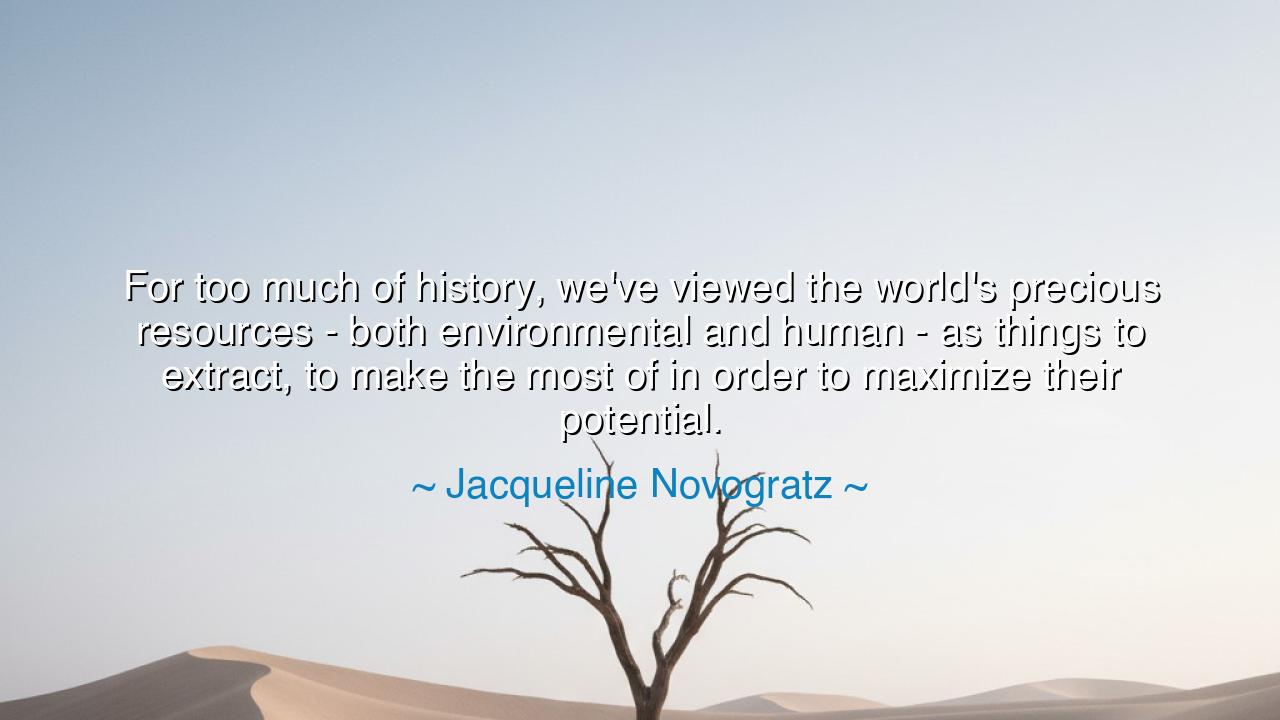
For too much of history, we've viewed the world's precious
For too much of history, we've viewed the world's precious resources - both environmental and human - as things to extract, to make the most of in order to maximize their potential.






In the great arc of human history, Jacqueline Novogratz speaks with the clarity of one who has witnessed both progress and its peril. She says: “For too much of history, we've viewed the world's precious resources—both environmental and human—as things to extract, to make the most of in order to maximize their potential.” Within this reflection lies a profound truth about the spirit of civilization—its endless hunger to take, to consume, to dominate. Yet Novogratz’s words are not born of condemnation alone; they are a call to awakening, an invitation to remember that true wealth lies not in exploitation, but in stewardship.
From the earliest ages, humankind has walked a delicate path between creation and destruction. The environmental resources of the earth—its forests, rivers, minerals, and air—were once seen as gifts of the gods, to be revered and protected. Ancient farmers would thank the soil before harvest, and hunters would bow to the spirits of the beasts they slew. But with time, reverence gave way to mastery, and mastery to greed. The rise of industry, empire, and profit transformed the world into a vast marketplace where even the sacred could be weighed, bought, and sold. Thus, the earth became not a mother, but a mine.
Novogratz’s words echo across this long history. She reminds us that we have treated not only the environment as a resource to extract, but also the human spirit. Workers, laborers, and dreamers—men, women, and children—have too often been seen not as souls with purpose, but as tools for production, their worth measured in output, their humanity forgotten in the pursuit of gain. The same mindset that drills the earth’s depths for oil has often dug just as ruthlessly into the depths of human potential, seeking profit rather than dignity.
History offers powerful lessons. Consider the Industrial Revolution—an age of innovation and wealth, yet also of extraction. Coal fueled machines, and human lives fueled factories. In the sweat and smoke of progress, many forgot that the price of unchecked ambition is imbalance. It took centuries of reform, sacrifice, and awakening for society to recognize that prosperity built on exploitation is both fragile and hollow. And even now, the struggle continues. For though our machines are cleaner and our markets more complex, the same question haunts us: how long can a civilization thrive when it consumes more than it creates, when it takes without giving back?
Yet Novogratz does not speak in despair. Her vision is one of renewal. She is a pioneer of “patient capital,” an idea that redefines investment not as extraction, but as cultivation. Rather than stripping the earth and its people for short-term gain, she advocates for systems that empower, that restore, that nurture the potential within both nature and humanity. This is wisdom that the ancients would recognize—the same principle that guided farmers to leave fields fallow, or philosophers to remind kings that power without virtue leads only to ruin.
The lesson of her words is clear: we must move from extraction to reciprocity, from possession to partnership. The earth does not belong to us; we belong to it. The people we lead, employ, or serve are not instruments of our ambition, but fellow travelers in the great human story. To maximize potential is not to consume it—it is to cultivate it, to create systems that allow every life and every resource to flourish in balance.
Practically, this means living with mindfulness. Support enterprises that honor the planet and uplift its people. Question systems that take without restoring. Invest in education, sustainable agriculture, and renewable energy—not because they are fashionable, but because they are the foundation of lasting prosperity. In our daily lives, choose to give as much as we take, to build as much as we use, and to see the world not as an inventory of resources, but as a living network of relationships.
Thus, Jacqueline Novogratz’s words are not merely about economics—they are about the soul of humanity. “For too much of history, we’ve viewed the world’s precious resources as things to extract.” Let us, then, be the generation that remembers what our ancestors once knew: that to take without gratitude is to invite decay, but to give in harmony with the earth is to ensure abundance for all. This is not merely good policy—it is the path of wisdom, the way of those who would leave the world better than they found it.






AAdministratorAdministrator
Welcome, honored guests. Please leave a comment, we will respond soon